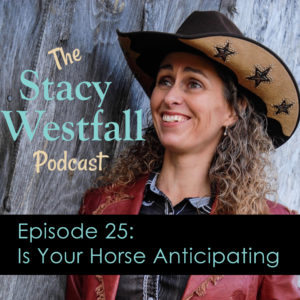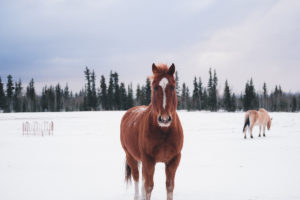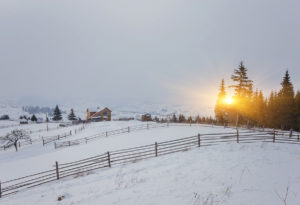Episode 25: Is Your Horse Anticipating?

Subscribe and never miss an episode! (I listen in the barn and when I’m out driving)
Subscribe For Free!
Anticipation is one of those ideas that is a double-edged sword. Is it a friend or Foe? At first glance, people think of anticipation as negative, I think it might be more positive to think of it as something we can balance on the teeter-totter. Sometimes, I call it trying too hard.
I want to help you guys think out of the box and not label things in a negative way. When we label anticipation as trying too hard, keep in mind that sometimes the horse will try too hard in ways we want and sometimes in ways we don’t want. Either way, you need to recognize that we use anticipation as a training tool in horse training, and that is what this episode is all about.
“The first thing you need to see is that the horse is actually trying too hard, not trying to be bad.” Stacy Westfall Click To TweetShow Notes
[02:36] We want the horse to anticipate.
[03:47] In training. after a certain amount of repetition, the horse will see a pattern.
[04:11] Anticipation is your friend when it helps in training.
[04:41] There is an arc of anticipation, just like in the bell curve. It starts out as a friend, but a point comes when it can be our enemy.

[04:58] If we don’t like the anticipation, we label it as negative.
[07:55] I had been teaching Jac a way of thinking for 50 hours. It involved the use of anticipation as a friend. You can actually see Jac remembering what we ended on and trying it.

[09:10] Often times patterns are put into horses by the rider. Switching things can change the anticipation.
[10:08] Horses can anticipate cues, and the rider backs off and the horse becomes more sensitive.
[11:31] Horses will sometimes try too hard and help you out, and the rider gets frustrated.
[12:27] If you can start seeing things from the horse’s point of view, he sees a pattern and is just trying to help you out.
[12:38] The first thing you need to see is that the horse is actually trying too hard not trying to be bad.
[13:01] You don’t want to get in an anticipation cycle with your horse. Realize when it is a problem for you.
[14:40] Go back in your mind to a time when you recognize anticipation happening. Work out from the horses point of view what he was trying to get to.
“If you can start seeing things from the horse's point of view, he sees a pattern and is just trying to help you out.” Stacy Westfall Click To TweetLinks and Resources:
Stacy’s Video Diary:Jac- Episode 26-Horse training is a conversation between horse and human
3 Comments
Leave a Comment
SUBSCRIBE TO THE PODCAST HERE:





YOURS FREE
WHY IS MY HORSE...?





Thank you so much for this episode!
I immediately thought of a particular riding lesson I had a few years back: I used to ride a wonderful mare who was very good at anticipation. This one day, my trainer had set up a trail pattern for us. The first try was OKish, but there were quite a few things that needed improvements. My trainer asked us to ride the whole pattern a second time before working on the different parts individually. So after the second ride my trainer said “that was absolutely spot on. Perfect ride!” and I replied “yes but I haven’t done a thing. I was merely a passenger on my horse who knows the pattern from the first round and performed perfectly all by herself.”
Unfortunately that horse has health issues, so I couldn’t ride her much longer but my question to you is: how do you train horses like her to go from doing things by herself to anticipating, but still waiting for my cue before actually performing the manouver?
Thank you for your input and your amazing work! Greetings from Germany!
Sounds like my first dressage lesson in the 5th grade. My mom and I went to take lessons and the horses would change gaits when the instructor called them out. My mind was blown…and then the instructor started spelling things. Thankfully the horses couldn’t spell…yet…
Inside of the horse trying hard to help you out, the rider should be able to make subtle shifts. For example, I want the horse to think about side-passing a log on auto-pilot (a form of anticipation) but I should be able to still stop the horse, or slow the horse, or change my mind. If the horse will let you make these adjustments…while still ‘seeing’ what is coming next…things get really fun!
First I definitely like your horse definitions. Your definitions are positive which I like!! The loping example you gave is SPOT ON!!!! I can not believe you used that as an example!!! That has Hildy and I written all over it :). Now I have to work on reversing that! Before I came to your clinic last year I could not ride with my legs on Hildy. It was awful. My legs were always off her. Now I can which is unbelievable, however as far as the leg is concerned about having her lope off, I use light pressure just as you mentioned in this podcast. I try not to use so much pressure because she is so sensitive and I also notice that I use a soft sounding kiss. So how should I fix this? I have a lot to work on. Just so you know I have not ridden for almost 2 weeks. It has rained pretty much every day and nothing is drying out 🙁